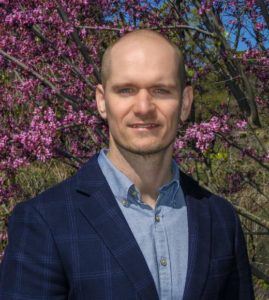Dr. David Olson is a chemical neuroscientist and assistant professor at the University of California, Davis. He directs the University’s Olson Research Group (Olson Lab), which researches psychoplastogens and their potential to treat a range of neuropsychiatric diseases. Psychoplastogens are molecules that can promote neural plasticity — in other words, the brain’s ability to grow and adapt. He is also the President and CEO of Delix Therapeutics, a startup that develops non-hallucinogenic compounds to treat mental disorders.
Dr. Olson graduated from Union College in 2006 with a BS in chemistry and earned his PhD in organic chemistry from Stanford University in 2011. He went on to do his postdoctoral work at the Broad Institute, a cross-disciplinary joint initiative of MIT and Harvard formed to advance understanding and treatment of human disease through genomics. In 2015, Dr. Olson joined UC Davis and started the Olson Research Group. Delix Therapeutics was founded in 2019, born from his lab’s research.
The study of psychoplastogens is a relatively new field of research, pioneered by Dr. Olson. He introduced the term in a 2018 publication describing these “fast-acting therapeutics, capable of promoting structural and functional neural plasticity.” 1 His lab demonstrated these effects among several psychedelic compounds, including psilocin, LSD, MDMA, DOI, DMT, and ibogaine, in another 2018 study which Psychedelic Science Review covered. His research was inspired by ketamine’s efficacy in treating depression and its hypothesized mechanism of action being the promotion of cortical neuronal growth. Of chief concern in his lab’s research is to what degree hallucinogenic effects are necessary for these substances’ plasticity-promoting benefits.
A March 2019 study by Dr. Olson and colleagues examined the effects of DMT microdosing in rats.2 They found evidence that microdosing can alleviate depression and anxiety but also identified potential risks with respect to neuronal atrophy and metabolic disruption.
In a release from UC Davis, Dr. Olson stated, “Our study demonstrates that psychedelics can produce beneficial behavioral effects without drastically altering perception, which is a critical step towards producing viable medicines inspired by these compounds.” In an interview with Sammy Caiola of capRadio, he said, “Using these ahead of time on a regular dosing schedule potentially could be interesting as a preventive measure. There’s a lot more research that needs to be done in that area though.”
Dr. Olson and his colleagues later surveyed anonymous psychedelic users on their microdosing practice and experiences.3 The findings, published in January 2020, revealed that microdosing is relatively common and correlated with improved mood, decreased anxiety, enhanced memory, attention, and sociability. The study ranked among Psychedelic Science Review’s top 10 psychedelic studies of 2020.
In December 2020, the Olson Lab announced its formulation of a non-hallucinogenic analog of ibogaine that retained the natural compound’s anti-addiction and antidepressant properties.4 The analog, named tabernanthalog, is the property of Delix therapeutics. Dr. Olson explained the significance of the compound in an interview with NPR, saying, “What we need is a medicine that is so safe that you can take it home and put it in your medicine cabinet just like you would aspirin. And that’s really what we were trying to achieve.” He also described how tabernanthalog was created: “We lopped off the parts of the structure that gave rise to a lot of the deleterious effects, and we left the part of the structure intact that still was able to have anti-addictive and antidepressant properties.”
Dr. Olson has earned several awards for his research, teaching, and mentorship. He can be heard discussing his research on a February 2019 segment of WMAC’s Academic Minute and a March 2019 episode of Al Jazeera’s The Stream program. He discusses neuronal atrophy, neuroplasticity promotion in serotonergic psychedelics, and avenues for future research.
More information on Dr. David Olson’s work can be found on his ResearchGate profile.
